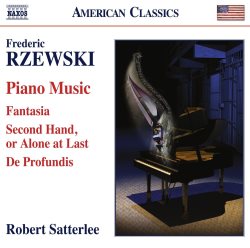| 
|
Frederic RZEWSKI (b.1938)
Piano Music
Fantasia (1989-1999) [7:06]
Second Hand, or Alone at Last (Six Novelettes for piano left hand) (2005) [19:53]
De Profundis, for Speaking pianist (1992) [28:39]
Robert Satterlee (piano)
rec. Mabel Shaw Bridges Hall of Music, Pomona College, Claremont, California, USA, 27-28 May 2007
NAXOS 8.559760 [55:38]
My first encounter with the music of this fascinating composer was a Bridge disc I reviewed in February 2013 of his extraordinary work The People United Will Never Be Defeated! I was mightily impressed by the incredible depth of expression embodied in that work. The same is abundantly evident again here.
Fantasia may look from the dates given above that its gestation as a composition took ten years but it refers to the fact that the original work was composed in 1989 to a commission from Japanese pianist Aki Takahashi and that ten years later Rzewski decided to create a new version which he said involved changing “the music to obscure the tune, putting in lots of wrong notes and kind of stomping on and smudging everything.” Without hearing the original it is hard to know how much he has changed things but this work is an extremely effective piece that despite all the intentional distortion of the source material he may have made still shines as having a lyrical core of considerable beauty. It would be interesting to have a disc offering both versions.
Second Hand, or Alone at Last was written for the pianist on this disc, Robert Satterlee. The composer writes that he was exploring what the left hand can do when he was not able to use his right for a period. He writes that it occurred to him that in a way the left hand was often a kind of poor relation that got left with simply accompanying the right. It made me think of the attitude of Philip Seymour Hoffman’s second violin in the film The Late Quartet. What Rzewski discovered was that the left hand was much more capable of complex manoeuvres than he had ever realised. This work explores its potential when “occupying the whole playing field”. It is a highly rewarding work that demands listening to many times as it reveals its many layered textures.
De Profundis, for Speaking pianist must surely be unique in concept for it requires the pianist to perform many unusual things from, as Robert Satterlee writes in the notes “... having the pianist recite an often wrenching text in notated rhythm, as well as singing, humming, whistling, hitting the body and the piano, using a Harpo horn, all while playing the score of considerable variety, drama and expressive detail.” The beginning has the pianist expel air in an almost strangled way while playing. This is often repeated throughout the work coupled with all kinds of other strange noises, some caused by using the body itself as another instrument by whacking the chest. The main spoken words comprise a ‘reading’ of Oscar Wilde’s long essay written to his lover Lord Alfred Douglas while he was imprisoned in Reading Gaol after being given two years hard labour for ‘homosexual offences’. In the most painful passage to quote Robert Satterlee’s notes Wilde “... recalls (his) failed relationship with Lord Alfred Douglas. Rzewski sets this in a compelling manner, by having the performer shut the keyboard lid and strike the body of the piano, all the while whispering despairing words about the poisoned relationship. The passage devolves into hysteria, where the performer chants nonsense syllables, makes animal noises, blasts out a bit of Leporello’s music from Don Giovanni, rails against government, and finally is left masochistically hitting various parts of the body.” By the end, having debated with himself on questions of art and its place in society as well as his place in the world he concludes that he can turn the entire experience from one of despair into something positive and when he is not “... torturing myself to really say, “What a beginning, what a wonderful beginning!””.
Now if this all sounds pretentious it is not; it is a tour de force that has an extremely serious intent. It makes for compelling listening with the music often comprising a Bachian fugue followed by shades of nineteenth-century romantic piano music as well as frantic crashes of unmusical notes. The music cannot be listened to in isolation since everything is necessarily intertwined. Obviously it is not a work to be listened to for relaxation nor can it be appreciated by everyone without hearing it several times. It will grow on the listener who is not immediately grabbed by it as I was.
Robert Satterlee does an amazing job with all the works on the disc, especially Second Hand, or Alone at Last. My only criticism is that his spoken words in De Profundis lacked the dramatic weight that someone who has done some acting would be able to give them.
That said, this is a fascinating disc of music from a truly interesting and thought-provoking composer. It’s brilliantly played and well worth exploring by anyone prepared to take on more challenging works. At the famously keen Naxos price this represents a worthwhile punt even for the uninitiated.
Steve Arloff
 |
 |
|



 All Nimbus reviews
All Nimbus reviews








